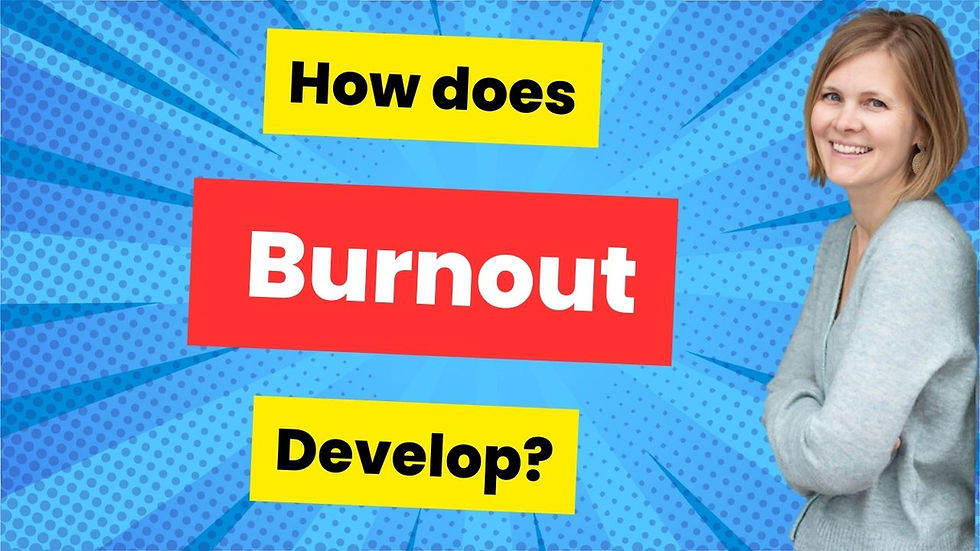This article has been adapted from episode 140 of The Aspiring psychologist Podcast. If you prefer you can listen here or watch here.
In the latest episode of The Aspiring Psychologist Podcast, Dr. Marianne Trent is joined by Dr. Claire Plumbly to explore the intricate stages of burnout. This episode is part of the Burnout Bites series, aimed at providing a comprehensive understanding of burnout to help individuals recognise and manage it effectively.
Introduction to Burnout
Burnout is often perceived as a singular state of exhaustion, but Dr. Plumbly reveals that it actually progresses through five distinct stages. Understanding these stages is crucial for recognising burnout early and implementing strategies to manage it.
Stage One: The Honeymoon Phase
The honeymoon phase is characterised by high energy levels and enthusiasm. At this stage, individuals feel satisfied with their work and are driven by their goals. However, the risk lies in overcommitting and neglecting other aspects of life, such as hobbies and social connections. Dr. Plumbly highlights the importance of pacing oneself and maintaining boundaries even during this seemingly positive phase.
Stage Two: The Onset of Stress
As the initial excitement wanes, the reality of the demands begins to set in. External stressors such as too much work, lack of autonomy, and feeling unsupported start to emerge. Signs of this stage include irritability, impatience, difficulty switching off, and neglecting personal needs. Recognising these signs early can prevent progression to more severe stages of burnout.
Stage Three: Chronic Stress
If the stress from stage two is not addressed, it can develop into chronic stress. This stage is marked by more pronounced physical and cognitive symptoms, such as headaches, back pain, reduced libido, difficulty concentrating, and unhealthy coping mechanisms like procrastination and doom scrolling. Dr. Plumbly advises that tending to one's nervous system and implementing stress-relief strategies is crucial at this stage.
Stage Four: High Functioning Burnout
In this stage, individuals may still perform their daily tasks but feel increasingly drained. Decision-making becomes overwhelming, and negative self-comparisons and cynicism set in. Physical symptoms intensify, and the individual may feel trapped and start having escapism thoughts. Dr. Plumbly suggests that recognising these signs and seeking support can help manage this stage effectively.
Stage Five: Habitual Burnout
Habitual burnout is the most severe stage, where burnout becomes deeply ingrained. The body and mind reach a breaking point, often resulting in being signed off work or experiencing intense physical symptoms like panic attacks or non-epileptic seizures. Recovery from this stage requires significant time and support. Dr. Plumbly emphasises the importance of self-care and educating those around you to understand and support your recovery process.
Managing Burnout at Different Stages
Dr. Plumbly stresses the importance of recognising burnout on a continuum rather than a binary state. Early stages require maintaining boundaries and self-care practices, while later stages necessitate more intensive interventions and support. Having a support system in place, such as colleagues or family members who can help monitor your stress levels, is invaluable.
Support Systems and Self-Care
Maintaining self-care routines and seeking support from others can significantly impact the management of burnout. Dr. Plumbly encourages scheduling self-care activities, like exercise classes or social calls, and keeping them a priority. She also highlights the importance of having people in your life who can help you stay on track and provide a reality check when needed.
Conclusion
Burnout is a multifaceted issue that progresses through distinct stages. Recognising these stages and implementing appropriate strategies at each point can prevent the escalation of burnout and promote better mental health. Dr. Claire Plumbly’s insights offer valuable guidance for anyone dealing with stress and burnout, whether personally or professionally.
For more in-depth discussions and practical advice, tune into the Aspiring Psychologist Podcast and explore Dr. Plumbly’s book, "Burnout: How to Manage Your Nervous System Before It Manages You." Connect with Dr. Marianne Trent and Dr. Claire Plumbly on social media for additional resources and support.
Check out my books for Aspiring Psychologists here: https://www.goodthinkingpsychology.co.uk/my-books
Be the first in the loop when new podcast episodes land by signing up to Dr Marianne Trent's free weekly newsletter by clicking here.
-300mm.jpg)

Comments